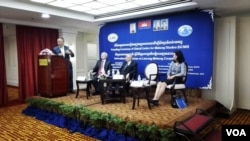A regional research organization led by China was launched in Phnom Penh this week aimed at advising Southeast Asian governments under a policy initiative launched by Beijing two years ago.
The Global Center for Mekong Studies (GCMS) comprises six leading regional “think tanks”: the China Institute for International Studies (CIIS); the Cambodian Institute for Cooperation and Peace (CICP); the Diplomatic Academy of Vietnam (DAV); the Laos Institute of Foreign Affairs (IFA); the Myanmar Institute of Strategic and International Studies (MISIS); and Thailand’s Devawongse Varopakarn Institute of Foreign Affairs (DVIFA).
The aim of the GCMS is to provide academic recommendations to member countries of the Lancang-Mekong Cooperation Mechanism (LMC), a Beijing-led foreign policy initiative launched in 2015, according to CICP.
The center will “act as a spokesperson for strategic communication with privilege regarding matters of the LMC,” said Prince Norodom Sirivudh, chairman of the CICP.
The largely China-funded initiative will receive new “intellectual support” to Mekong countries from China, said Zuo Wenxing, political counselor at the Chinese Embassy in Phnom Penh.
“Think tanks are an important part of the LMC process,” she added. “We look forward to ... insights and suggestions.”
The GCMS member institutes will take turns in chairing the group, while most of the funding for the initiative will come from China’s investment in the LMC process, said CICP.
Rong Ying, CIIS vice president, said the Greater Mekong Sub-region was “very important” to China’s future.
“Politically I think this means a lot to China’s policies for a good neighborhood,” he said.
China has become the leading investor and donor to several Southeast Asian nations, including Cambodia, and has relied on support from Cambodia and Laos in international forums where it has disputes with other countries in the region, including over its ambitions in the South China Sea.




